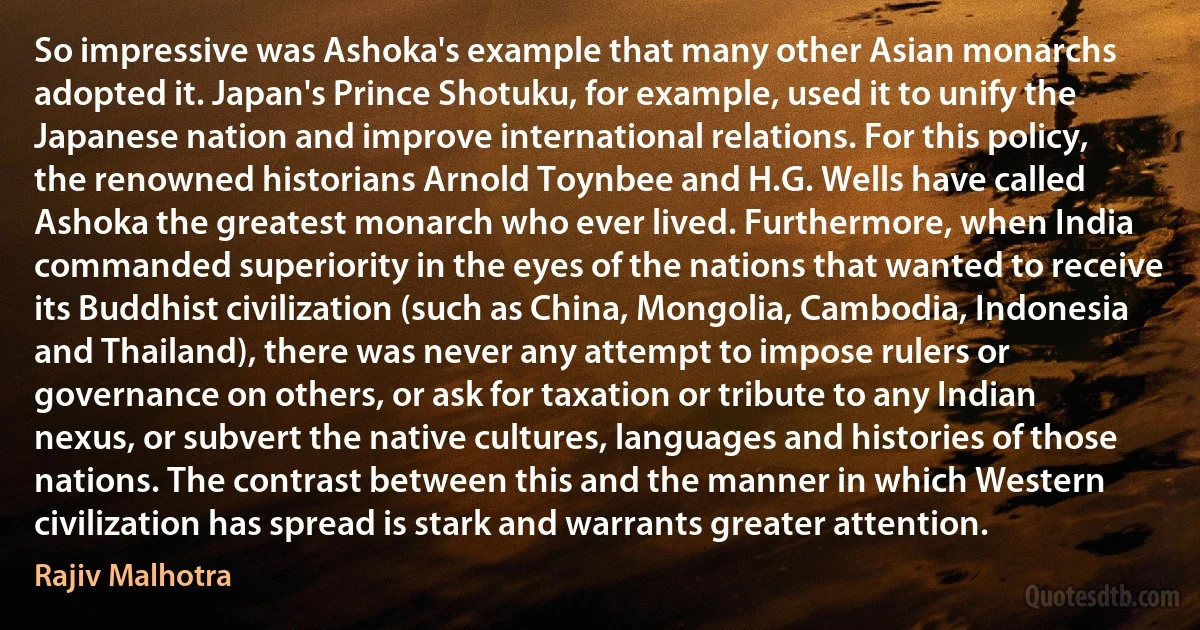
So impressive was Ashoka's example that many other Asian monarchs adopted it. Japan's Prince Shotuku, for example, used it to unify the Japanese nation and improve international relations. For this policy, the renowned historians Arnold Toynbee and H.G. Wells have called Ashoka the greatest monarch who ever lived. Furthermore, when India commanded superiority in the eyes of the nations that wanted to receive its Buddhist civilization (such as China, Mongolia, Cambodia, Indonesia and Thailand), there was never any attempt to impose rulers or governance on others, or ask for taxation or tribute to any Indian nexus, or subvert the native cultures, languages and histories of those nations. The contrast between this and the manner in which Western civilization has spread is stark and warrants greater attention.
Rajiv MalhotraRelated topics
ask attempt attention contrast example impose international monarch nation nexus prince receive spread subvert taxation western others relations arnold cambodia mongolia indonesia eyesRelated quotes
There is widespread belief throughout the free world that, but for American nuclear superiority, Europe would already have been reduced to satellite status and the Iron Curtain would have reached the Atlantic and the Channel. Unless a trustworthy and universal agreement upon disarmament, conventional and nuclear alike, can be reached and an effective system of inspection is established and is actually working, there is only one sane policy for the free world in the next few years. That is what we call defence through deterrents. This we have already adopted and proclaimed. These deterrents may at any time become the parents of disarmament, provided that they deter. To make our contribution to the deterrent we must ourselves possess the most up-to-date nuclear weapons, and the means of delivering them.

Winston Churchill
Hindus suffered such attempted extermination in East Bengal in 1971, when the Pakistani Army killed 1 to 3 million people, with Hindus as their most wanted target. This fact is strictly ignored in most writing about Hindu-Muslim relations, in spite (or rather because) of its serious implication that even the lowest estimate of the Hindu death toll in 1971 makes Hindus by far the most numerous victims of Hindu-Muslim violence in the post-colonial period. It is significant that no serious count or religion-wise breakdown of the death toll has been attempted: the Indian, Pakistani and Bangladeshi ruling classes all agree that this would feed Hindu grievances against Muslims.... Even apart from the 1971 genocide, "ordinary" pogroms in East Pakistan in 1950 alone killed more Hindus than the total number of riot victims in India since 1948.

Koenraad Elst
Japan had come to terms with Russia because of her difficulties, but this did not mean approval of communism. Communism meant the end of emperor-worship, and feudalism and the exploitation of the masses by the ruling class, and indeed almost everything that the existing order stood for... But communism is the outcome of widespread misery due to social conditions, and unless these conditions are improved, mere repression can be no remedy. There is a terrible misery in Japan at present. The peasantry, as in China and India, are crushed under a tremendous burden of debt. Taxation, especially because of heavy military expenditure and war needs, is very heavy. Reports come of starving peasants trying to live on grass and roots, and of selling even their children. The middle classes are also in a bad way owing to unemployment and suicides have increased.

Jawaharlal Nehru
Whenever Israel faces a public relations debacle such as the Intifada or international pressure to resolve the Israel-Palestine conflict, American Jewish organizations orchestrate this extravaganza called the 'new anti-Semitism.' The purpose is several-fold. First, it is to discredit any charges by claiming the person is an anti-Semite. It's to turn Jews into the victims, so that the victims are not the Palestinians any longer. As people like Abraham Foxman of the ADL put it, the Jews are being threatened by a new holocaust. It's a role reversal – the Jews are now the victims, not the Palestinians. So it serves the function of discrediting the people leveling the charge. It's no longer Israel that needs to leave the Occupied Territories; it's the Arabs who need to free themselves of the anti-Semitism.

Norman Finkelstein
There are buildings which will hold a few, but which will break down under the weight of a crowd. The ice of the river may be strong enough to bear a man, but would break through under the weight of an elephant. The ice under us in this country is very thin, and is made very weak by the warm fogs of prejudice... Our policy should be to unite with the great mass of the American people in all their activities, and resolve to fall or flourish with our common country. We cannot afford to draw the color-line in politics, trade, education, manners, religion, fashion, or civilization. Especially we cannot afford to draw the color-line in politics. No folly could be greater. A party acting on that basis would be not merely a misfortune, but a dire calamity to our people.

Frederick Douglass
